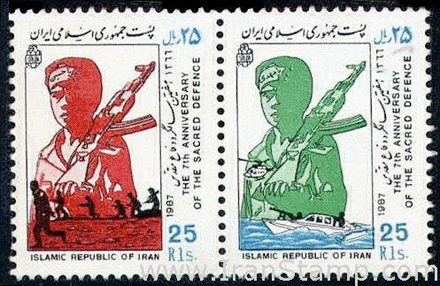
Tehran, Summer 1987
In the first years of war nothing looked like any of the images we’d seen in the movies. Tehran’s trees didn’t grow burnt leaves, or dead dangling legs. The mountains of the north, bordering the city, didn’t vanish behind fuming hurricanes of smoke. The black flock of planes didn’t drop bombs over the shelters where women and children screamed and hopeless men held their heads high to die with dignity or patriotism. An expanding mushroom cloud didn’t rise in the horizon to give us incurable diseases. Every minute, the injured sirens didn’t blast their annoying moaning in the background of our conversations. Hunger didn’t bloat our bellies and we weren’t totally deprived of water, gas, or electricity. The school bells didn’t go silent and Mrs. Principal, unfortunately, didn’t disappear. Our martyrs didn’t look heroic and their photos, displayed on tree trunks, on streetlamps, on crooked walls of abandoned gardens, and on all the windows of Daryani chain of grocery stores, didn’t look clear, as if the picture had been taken a long time ago when war was just a movie or the half a book title, and death still seemed like something unimaginable.
When we were thirteen, on a cold winter day, during religion class, while Sheerin and I were making paper planes under the table, the new teacher gave us two options: writing ten different names of God or five common traits of the Shiite Twelvers. I raised my hand and asked Mrs. Maloof if I could write about seven definitions of happiness in the Quran. The teacher looked at me blankly, and the class went mute. She approached me, her black chador revealing her long face, her thin mustache, her sad eyes and her colorless lips sewn together. “Happiness is not an Islamic concept,” she finally said tenderly. “The West has invented this idea to corrupt your mind.”
We lived among our worst enemies, the enemies of happiness, still we felt lucky, because none of the buildings of our apartment complex got demolished. Even the death of Mr. Jalali’s son in the war front didn’t seem overly alarming, since his wife still waited in different lines with us, her booklet of coupons in hand, squeezing it hard as if her life depended on it, and we didn’t take her loss seriously given that each time we said hello she replied with a soft nod and a fainting hi.
The war went on for years, with a few bombs here and there in Tehran, and the thousands of soldiers rotting on the hot and humid shallow shores of Karoon River under the sunshine.
Still, we kept our routines; in the evenings, Sheerin danced in front of a mirror in her room, in the dark, to lose weight, while her mom washed the dishes. Before bedtime, Auntie, my new mom, murmured a song from pre-revolutionary times when she was married and in love, when her beloved Mohsen Khan hadn’t left her yet. In those nights, Auntie rubbed the cloth hard over the plates and cups and forks and spoons and spatulas and dried even things that didn’t really need to be dried, as if everything looked wet from behind the curtain of memories.
Auntie rarely socialized, but it had nothing to do with the war. She was too busy, so we stayed at home and when my homework and the dishes were done, if the power outage hadn’t made us sleepy, we watched a pale duplicate of Gone with the Wind, Auntie’s favorite. Otherwise we played cards on the kitchen table and under the yellow flickering light of a candle. Every day Sheerin and I grew taller than the day before, while Auntie lost her fat cheeks and her round belly and her soft skin and her nostalgia became the only part of her that grew taller than us. Sometimes when the electricity was cut, Auntie told me stories she knew by heart, tales and fables that weren’t true, because we couldn’t stand the truth anymore. As long as the war kept on, we were going to read happy-ending stories where the hero never dies or kills himself.
Most of the times Sheerin and I weren’t happy, still sometimes we laughed so hard that it looked like crying. We were told respectable young girls shouldn’t laugh in public. That’s why we only pretended to laugh when we knew we were watched; otherwise we were really sad inside. Our dark rooms, our pink pillows and our pink blankets kept our secret and our loose headscarves and our tight shiny overcoats and our American blue jeans covered up our gloom so nobody could mistake us for any of those sad-looking respectable young girls.
One night, when I was alone in my room, I lay on the scratchy carpet, a single candle lighting the room. I stretched my hand over the petty flame to feel its warmth. The heat went up my arm and my shoulder, as I was bringing my hand lower. It reached the tip of the blazing fire. My fingers were going to melt, I thought, my flesh dripping on the carpet, making a mess.
Watching my hand burning, I had the thought that if it was someone else’s palm, I’d have never guessed its pain.
That’s how we grew up, going on, but there were days we couldn’t. Or we didn’t want to; days we skipped school or dinner. Days we stayed in our rooms, to fall asleep at six and to wake up the next day, at three in the afternoon.
We had nothing to do. We had so much to imagine.
Even though instead of dreaming of the future we just had fantasies about the past, even though we didn’t live in peace and we were scared of almost everything, without ever remembering a time when we weren’t scared, we felt confident; we knew we were invincible and great things were about to happen to us.






